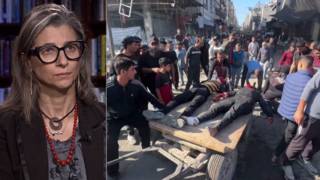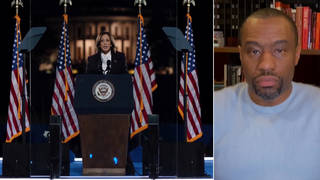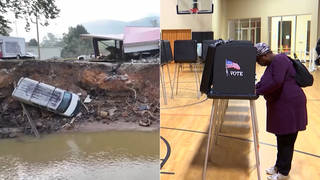
Related
Migrant children held by the Biden administration are reporting suicide and escape attempts and conditions of spoiled food, extreme heat and panic attacks in the largest so-called emergency shelter for migrant children in the U.S., at the Fort Bliss military base in El Paso, Texas. More than 14,000 migrant children are currently in the custody of the Department of Health and Human Services, which has set up 15 emergency sites like the one at Fort Bliss to get them out of overcrowded Border Patrol holding facilities. Vice President Kamala Harris did not visit the Fort Bliss tent city on her recent visit to the southern border, and Department of Health and Human Services Secretary Xavier Becerra was met with protests when he toured the facility Monday. “We have seen so many instances of potential abuse inside that specific detention center,” says Fernando García, founding director of the Border Network for Human Rights, who met with Harris during her visit. “Instead of investing in jails,” he says the administration should take a more humane approach and “build welcoming centers to expedite family reunification.”
Transcript
AMY GOODMAN: This is Democracy Now! I’m Amy Goodman, with Juan González.
Suicide attempts, spoiled food, extreme heat — these are among the conditions described by boys and girls held at the country’s largest emergency so-called shelter for migrant children, on the Fort Bliss military base in El Paso, Texas. The unlicensed facility has been described as a tent city that can hold 10,000 unaccompanied children in soft-sided tents on desert land. It currently holds about 800 kids, all boys.
Vice President Harris did not visit the site when she traveled to El Paso Friday on a visit to the border. That task was left to the secretary of the Department of Health and Human Services, Xavier Becerra, who was met with protests when he toured Fort Bliss on Monday.
GIRL: Shut it down! Shut it down! Shut it down!
AMY GOODMAN: “Shut it down,” the little girl is saying. “Shut it down.”
More than 14,000 migrant children are now in the custody of the Department of Health and Human Services, which set up 15 emergency sites like Fort Bliss to get them out of overcrowded Border Patrol holding facilities. But some kids have been held there for months. Court records cited by CBS News quote a 17-year-old Guatemalan girl held at Fort Bliss for 60 days, who said she got so anxious, she once fainted, and that after she reported not sleeping for three days, she was prescribed medication. During an event last Thursday, Becerra defended conditions at Fort Bliss.
HHS SECRETARY XAVIER BECERRA: I will agree with anyone who says that that’s not where you’re going to do long-term care for a child. We get that. But it’s far better than the deserts they were in. It is far better than an adult detention facility. And it is absolutely providing them, these children, with everything you would expect a child to get to provide for their basic needs and attention that they require.
AMY GOODMAN: For more, we go to El Paso, Texas, to speak with Fernando García, founding director of the the Border Network for Human Rights, which has been part of protests to shut down the emergency so-called shelter at Fort Bliss, among the advocates who actually spoke to Vice President Kamala Harris on Friday.
Fernando, thanks so much for joining us again. Why don’t you start off by talking about your demands to close this site for children at Fort Bliss, and then what you said to the vice president Friday?
FERNANDO GARCÍA: Yes, Amy and Juan, thanks for having me again.
Listen, we have done this several times already; this is not the first protest. We did it — we’ve been doing it like very often, because we — since the very beginning, we had seen thousands of unaccompanied minors arriving to this location. Listen, there are too many problems with this location. The first one is that this is a military base now. This is Fort Bliss. And as you might imagine, there is no accountability and transparency. I mean, nobody can go into Fort Bliss without going through a number of filters. So access to that location is very difficult for media, but also for human rights organizations. So I think that that is fundamentally a problem. The second thing is what that represents. I mean, what is the message that having children in a military base represents? I mean, that means that they are a danger for our society? It is incomprehensible in that sense.
But going back to the question of why we’re protesting is, we have seen so many incidents of potential abuse inside that specific detention center. They call them shelters, but, for us, it’s a detention center. And it was mentioned in the introduction — I mean, we had people reporting to us directly about the lack of food, healthcare, the lack of basic services, but also to a point that teenagers, children have decided to commit suicide because of the conditions inside. So, I think, for us, it’s beyond repair. I think no improvement would be enough. I think, for us, it is important that this administration close this detention center. So, that is what the protest was about.
And when the vice president came, to be honest, I mean, we thought that it was going to be a political show. As you know, always it’s a political show. Whatever the people in this or in the former administration do, it’s exactly that. So we were concerned about it. But we had a chance to meet with Vice President Harris, and, surprisingly, she was listening. And she listened to what we proposed. It was a very short meeting, less than an hour. But I think she was engaged. And I think now I really appreciated that opportunity.
JUAN GONZÁLEZ: And, Fernando, in terms of the Biden administration saying that they at least have been working to reduce the number of children from several — from a few months ago, do you see, generally speaking, that they’re moving in a better direction?
FERNANDO GARCÍA: No, I don’t think so. I mean, we have systemic problems with the detention centers for children in this country, especially at the border. One of them is that these detention centers are run by contractors, private contractors. When I say that, it’s that it is true that HHS is the entity that coordinates those detention centers or shelters, but they are run and the people that actually is taking care of those children are people connected to private contractors. So, we don’t believe that that is the option, whether there are 4,000 children or 800 children. I think that doesn’t change the dynamic that there’s a fundamental lack of transparency and, secondly, that those children shouldn’t be detained at all.
I think we were protesting here yesterday, and probably you’ve heard that, that we are asking for these detention centers to be closed, but also to reunify those children with their family members. Eighty percent of those children, unaccompanied minors, they have a relative in the United States that can receive them. So I think they should have improved that process. They should invest mostly on reunifying these children with their families, rather than building these shelters and these facilities.
JUAN GONZÁLEZ: And I wanted to ask you about the continued role of the U.S. in denying, whether — no matter what administration, the U.S. impact on migration. It’s the U.S. foreign policy in Central America. Vice President Harris, when she went to Central America recently, did not acknowledge the U.S. role in creating these crises. Your response to that?
FERNANDO GARCÍA: Well, you know, if we really want to tackle down root causes, we need to recognize that the United States is responsible for many of those root causes that actually expel people from their countries. Let’s take for example a couple of things.
Violence and mayhem in armed criminal bands in Central America and in Mexico — well, the weapons that they are getting, they are getting them from the United States. And nothing is being done in that regard. So, I mean, if we want to stop the violence, we need to start here in the United States and be willing to stop the flow of weapons.
And secondly, we’re talking about people fleeing economic conditions, poverty, lack of basic services. Well, the economic agreements that the United States has in the past proposed and actually carried out are the result — I mean, they are a part of the problem in that sense, that they are not creating the conditions where workers will have a living standard, better wages, housing and healthcare. So, people is going into Central America, companies are going into Central America with these trade agreements, but they are not paying more. They are not raising the economic levels and the economic standards. So we need to start with reforming those economic agreements to actually be sure that we have enough to invest in those countries so people do not have to leave their countries.
AMY GOODMAN: So, Fernando, apparently, Vice President Harris went to El Paso because that’s where Trump’s separation policy began, and the Biden administration wanted to show the difference between them. There were a few photo ops a few weeks ago showing families reunited. But, in fact, aren’t there still thousands of children who are not reunited? What is happening in this case? Isn’t even Dr. Biden, Jill Biden, involved with overseeing the speeding up of this process? As you describe, 80% of these kids have family members in the United States. How are they changing the Trump policy?
FERNANDO GARCÍA: Listen, this is what I see with this administration. At the political national level from the White House, we do see a different narrative. I think there’s a different message in regards to the last administration. I think Biden and Vice President Harris, it seems that they are saying that they are committed to have a dignified border, to rehumanize immigration. All of that is good. But that has not been yet translated to the ground.
I mean, here at the border, we’re still having at least two major problems, that we have mentioned already, that have not changed. One of them is Title 42. Title 42 is what I consider an illegal program that is expelling refugees, families and children without due process. And many of them are fleeing this violence and are coming to the United States to ask for protection, and they are being expelled, thousands of people being expelled. That program was implemented by Trump. It should have been gone the first day of this administration. It has not.
So, the second thing is precisely that we have thousands of children in detention. So, instead of investing in jails, instead of investing in detention centers, in these big shelters, in Fort Bliss, for example, this administration should have done exactly that: build welcoming centers to expedite the family reunification and to do it in a different way. But we have not seen that, specifically. So, I think one is the national rhetoric, and the second thing is, what is happening at the border is not necessarily reflecting that rhetoric.
AMY GOODMAN: Well, we want to thank you so much for being with us, Fernando García, founding director of the Border Network for Human Rights in El Paso. He met with Vice President Harris when she went to the border on Friday.
That does it for our show. A happy belated birthday to Jon Randolph. Democracy Now! is produced with Renée Feltz, Mike Burke, Deena Guzder, Messiah Rhodes, Nermeen Shaikh, María Taracena, Carla Wills, Tami Woronoff, Charina Nadura, Sam Alcoff, Tey-Marie Astudillo, John Hamilton, Robby Karran, Hany Massoud, Adriano Contreras. Our general manager is Julie Crosby. Special thanks to Becca Staley, Miriam Barnard, Paul Powell, Mike DiFilippo, Miguel Nogueira, Hugh Gran, Denis Moynihan. I’m Amy Goodman, with Juan González. Stay safe.













Media Options